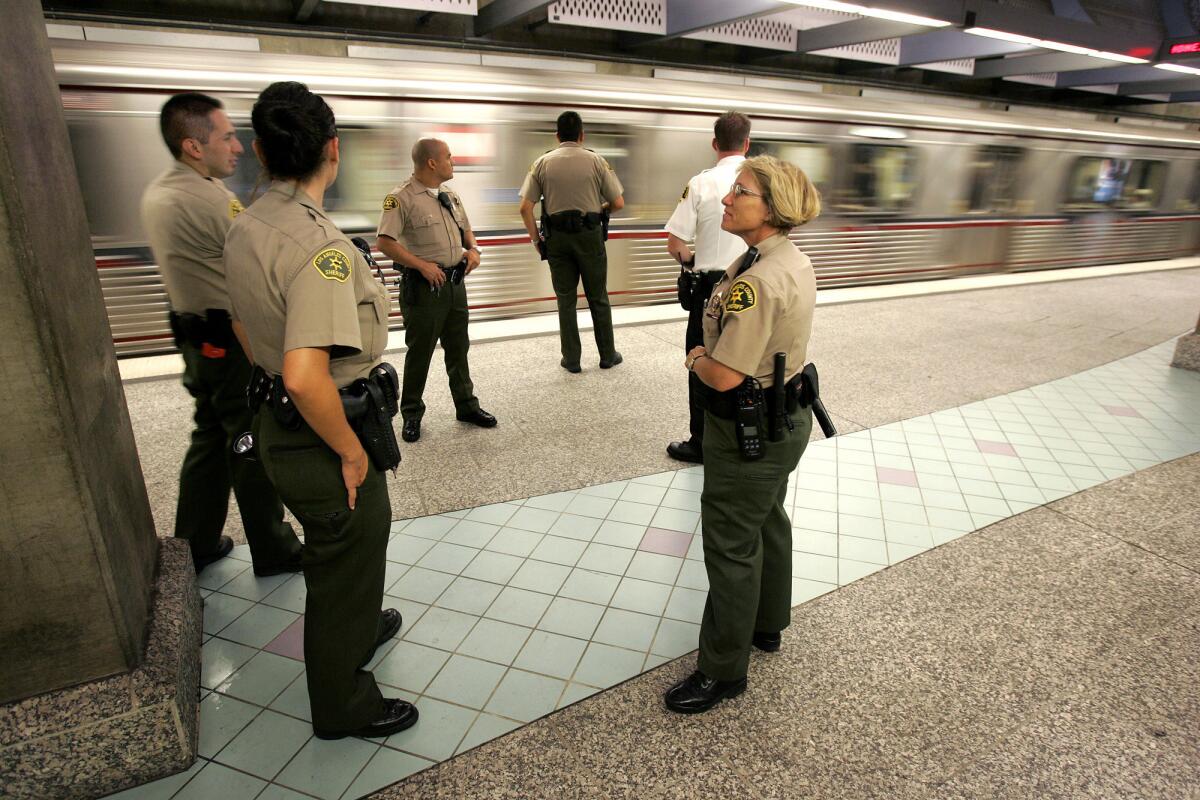1 in 5 riders face unwanted sexual behavior on L.A. Metro, survey says

- Share via
More than one in five Metro passengers were subjected to unwanted sexual advances or behavior while riding Metro trains and buses in Los Angeles County during the first half of 2014, according to a new survey.
As part of a semi-annual customer review, the Los Angeles County Metropolitan Transportation Authority asked more than 22,000 bus and rail passengers if they had experienced “unwanted sexual behavior including, but not limited to, touching, exposure, or inappropriate comments” over a six-month period.
About 22% of passengers, or 4,850 people, said yes.
“We don’t think this is acceptable,” Metro spokesman Paul Gonzales told The Times.
Last winter, Metro asked passengers if they experienced unwanted sexual advances that made them feel unsafe, and 18% said yes. That figure isn’t comparable to this year’s 22% figure because the “feeling unsafe” portion of the question was removed.
The question was reworded so Metro could compare responses to law enforcement statistics, said Jeff Boberg, an agency transportation manager who works with data and research. In the next survey, to get more specific data on what passengers are experiencing, Metro will ask additional questions about verbal harassment and unwanted physical contact, he said.
The Los Angeles County Sheriff’s Department, which polices Metro, received 31 reports of indecent exposure in 2014 and made 12 arrests; 62 reports of inappropriate touching and made 18 arrests; and six reports of inappropriate comments and made two arrests, Gonzales said.
One point of concern, officials said, is the relatively low number of police reports compared to the number of passengers who say they experienced harassment.
“Many people who are having this kind of experience aren’t reporting it,” Gonzales said. “We want passengers to know this isn’t a part of life.”
Metro has also partnered with Peace Over Violence, a sexual and domestic violence prevention group, to create an awareness campaign that will launch in April.
Adding more deputies to bus or rail lines to prevent sexual harassment isn’t realistic, Gonzales said, because that would require hundreds of law enforcement personnel every day.
Instead, Metro depends on good information from passengers and drivers. When someone assaults or otherwise harasses someone, “that’s typically his regular bus,” Gonzales said. With a good police report, including a description, officers can board the same line later in the week and make an arrest, he said.
Survey workers contracted with Metro distribute surveys, printed in English and Spanish, on every transit line at least once every six months. Around two dozen surveyors ride bus lines for eight to 12 hours at a time, to capture mid-day passengers and commuters.
Anyone who sees inappropriate behavior should call 911 or the sheriff’s hotline: (888) 950-SAFE (7233).
For more Los Angeles transportation news, follow @laura_nelson on Twitter.
More to Read
Sign up for Essential California
The most important California stories and recommendations in your inbox every morning.
You may occasionally receive promotional content from the Los Angeles Times.











